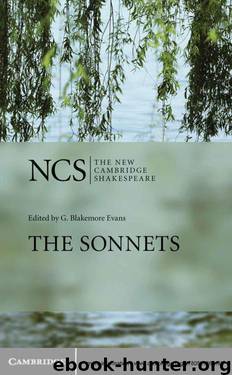The Sonnets (The New Cambridge Shakespeare) by William Shakespeare

Author:William Shakespeare [Shakespeare, William]
Language: eng
Format: epub, mobi
Publisher: Cambridge University Press
Published: 2006-06-22T04:00:00+00:00
Sonnet 70
The attitude toward the youth’s ‘deeds’ expressed in 70 is very different from that in 69 (and from the criticisms offered in 33–6, 40–2), particularly the statement about his ‘pure unstainèd prime’ (lines 8–10); nevertheless ‘slander’s mark’ (2) seems to look back to the ‘churls” thoughts in 69.11 and to deny those thoughts, even though the couplet in 69 suggests that there is some substance to what the ‘churls’ had ‘guessed’ from the youth’s ‘deeds’. However, as Hood notes, the pivot of the argument here is the conditional phrase ‘So thou be good’ (5) and much depends on the degree of confidence with which that is proposed. It will eventually become not just a preliminary condition but an admonition – in 94 and 95 for example.
1 That thou are . . . defect i.e. the fact that you are censured ought not (‘shall not’) to be taken as evidence of any fault or flaw in you. For the occasional use of ‘are’ with ‘thou’ for euphony before a consonant, see 47.10 n. and Franz 152. Compare Jonson, Epigrammes, 72.1: ‘ . . . thou are started up’.
2 For slander’s . . . fair Because beauty (‘the fair’, both inner and outer) has always been the target or butt (‘mark’) of slander (= false or malicious statements, calumny). Proverbial: ‘Envy (calumny) shoots at the fairest mark’ (Tilley E175).
3 ornament . . . suspèct suspicion (of inner evil) is automatically associated (by envious churls and slanderers) with anyone who is physically ‘fair’ (i.e. bears ‘The ornament of beauty’). Compare 69.12–13 and ‘envy’ in line 12 below. ‘Suspèct’ is used by Shakespeare only as a noun (see line 13 below). Compare Tilley B163: ‘Beauty and chastity (honesty) seldom meet.’ This statement contrasts with the underlying theme of the sonnet – the neo-Platonic concept of the ‘beautiful soul in the beautiful body’.
4 crow The antecedent is ‘suspèct’. The crow was considered a dirty, raucous, thievish, malicious, and ill-omened bird and was associated with the Devil. Tucker suggests that the crow is here shown as preferring to fly ‘in heaven’s sweetest air’ in order to pollute it.
4 heaven’s sweetest air Metaphorical for the youth (‘thou’); compare ‘sweetest buds’ in line 7.
5 So So long as, provided that.
5 doth but approve only proves or confirms.
6 Thy See collation and 26.12 n. on the misreading of MS. ‘thy’ as ‘their’.
6 worth high moral and intellectual quality.
6 being wooed of time (1) being tempted by (‘wooed of’) the promptings of your youth (‘time’); (2) being solicited and allured by (‘wooed of’) the immorality of the present age (‘time’; compare 66 and 67). As Hood notes, in either case, the idea is of being importuned but resisting (‘So thou be good’ (5)). The phrase has given rise to much discussion (see collation, Rollins, 1, 184, and Booth, p. 256).
7 For Because.
7 canker vice vice as an ulcer or cancer (with special reference to the ‘canker worm’ which devours ‘the sweetest buds’). See 35.4 n. and 95.1–3.
8 present’st offer (by your ‘beauty’, like ‘sweetest buds’, a perfect prey for ‘canker vice’).
Download
The Sonnets (The New Cambridge Shakespeare) by William Shakespeare.mobi
This site does not store any files on its server. We only index and link to content provided by other sites. Please contact the content providers to delete copyright contents if any and email us, we'll remove relevant links or contents immediately.
| Books & Reading | Comparative Literature |
| Criticism & Theory | Genres & Styles |
| Movements & Periods | Reference |
| Regional & Cultural | Women Authors |
4 3 2 1: A Novel by Paul Auster(12391)
The handmaid's tale by Margaret Atwood(7763)
Giovanni's Room by James Baldwin(7346)
Asking the Right Questions: A Guide to Critical Thinking by M. Neil Browne & Stuart M. Keeley(5775)
Big Magic: Creative Living Beyond Fear by Elizabeth Gilbert(5771)
Ego Is the Enemy by Ryan Holiday(5447)
The Body: A Guide for Occupants by Bill Bryson(5096)
On Writing A Memoir of the Craft by Stephen King(4943)
Ken Follett - World without end by Ken Follett(4731)
Adulting by Kelly Williams Brown(4574)
Bluets by Maggie Nelson(4556)
Eat That Frog! by Brian Tracy(4537)
Guilty Pleasures by Laurell K Hamilton(4448)
The Poetry of Pablo Neruda by Pablo Neruda(4106)
Alive: The Story of the Andes Survivors by Piers Paul Read(4031)
White Noise - A Novel by Don DeLillo(4009)
Fingerprints of the Gods by Graham Hancock(4004)
The Book of Joy by Dalai Lama(3986)
The Bookshop by Penelope Fitzgerald(3852)
